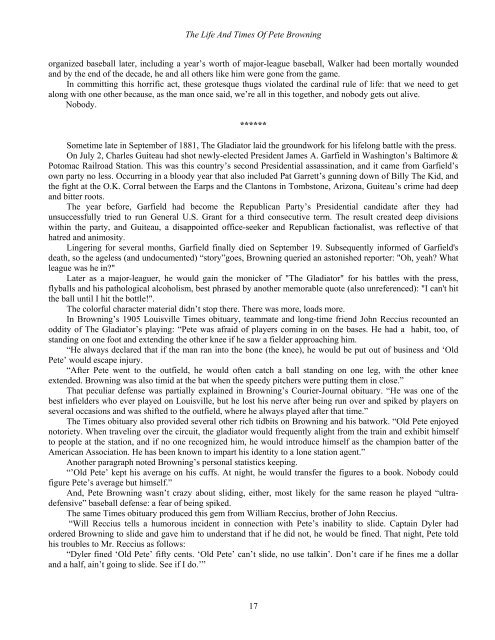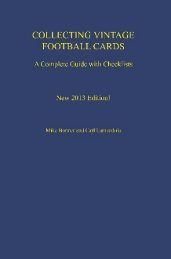AMERICAN GLADIATOR: The Life And Times Of ... - The Book Locker
AMERICAN GLADIATOR: The Life And Times Of ... - The Book Locker
AMERICAN GLADIATOR: The Life And Times Of ... - The Book Locker
You also want an ePaper? Increase the reach of your titles
YUMPU automatically turns print PDFs into web optimized ePapers that Google loves.
<strong>The</strong> <strong>Life</strong> <strong>And</strong> <strong>Times</strong> <strong>Of</strong> Pete Browning<br />
organized baseball later, including a year’s worth of major-league baseball, Walker had been mortally wounded<br />
and by the end of the decade, he and all others like him were gone from the game.<br />
In committing this horrific act, these grotesque thugs violated the cardinal rule of life: that we need to get<br />
along with one other because, as the man once said, we’re all in this together, and nobody gets out alive.<br />
Nobody.<br />
******<br />
Sometime late in September of 1881, <strong>The</strong> Gladiator laid the groundwork for his lifelong battle with the press.<br />
On July 2, Charles Guiteau had shot newly-elected President James A. Garfield in Washington’s Baltimore &<br />
Potomac Railroad Station. This was this country’s second Presidential assassination, and it came from Garfield’s<br />
own party no less. Occurring in a bloody year that also included Pat Garrett’s gunning down of Billy <strong>The</strong> Kid, and<br />
the fight at the O.K. Corral between the Earps and the Clantons in Tombstone, Arizona, Guiteau’s crime had deep<br />
and bitter roots.<br />
<strong>The</strong> year before, Garfield had become the Republican Party’s Presidential candidate after they had<br />
unsuccessfully tried to run General U.S. Grant for a third consecutive term. <strong>The</strong> result created deep divisions<br />
within the party, and Guiteau, a disappointed office-seeker and Republican factionalist, was reflective of that<br />
hatred and animosity.<br />
Lingering for several months, Garfield finally died on September 19. Subsequently informed of Garfield's<br />
death, so the ageless (and undocumented) “story”goes, Browning queried an astonished reporter: "Oh, yeah? What<br />
league was he in?"<br />
Later as a major-leaguer, he would gain the monicker of "<strong>The</strong> Gladiator" for his battles with the press,<br />
flyballs and his pathological alcoholism, best phrased by another memorable quote (also unreferenced): "I can't hit<br />
the ball until I hit the bottle!".<br />
<strong>The</strong> colorful character material didn’t stop there. <strong>The</strong>re was more, loads more.<br />
In Browning’s 1905 Louisville <strong>Times</strong> obituary, teammate and long-time friend John Reccius recounted an<br />
oddity of <strong>The</strong> Gladiator’s playing: “Pete was afraid of players coming in on the bases. He had a habit, too, of<br />
standing on one foot and extending the other knee if he saw a fielder approaching him.<br />
“He always declared that if the man ran into the bone (the knee), he would be put out of business and ‘Old<br />
Pete’ would escape injury.<br />
“After Pete went to the outfield, he would often catch a ball standing on one leg, with the other knee<br />
extended. Browning was also timid at the bat when the speedy pitchers were putting them in close.”<br />
That peculiar defense was partially explained in Browning’s Courier-Journal obituary. “He was one of the<br />
best infielders who ever played on Louisville, but he lost his nerve after being run over and spiked by players on<br />
several occasions and was shifted to the outfield, where he always played after that time.”<br />
<strong>The</strong> <strong>Times</strong> obituary also provided several other rich tidbits on Browning and his batwork. “Old Pete enjoyed<br />
notoriety. When traveling over the circuit, the gladiator would frequently alight from the train and exhibit himself<br />
to people at the station, and if no one recognized him, he would introduce himself as the champion batter of the<br />
American Association. He has been known to impart his identity to a lone station agent.”<br />
Another paragraph noted Browning’s personal statistics keeping.<br />
“’Old Pete’ kept his average on his cuffs. At night, he would transfer the figures to a book. Nobody could<br />
figure Pete’s average but himself.”<br />
<strong>And</strong>, Pete Browning wasn’t crazy about sliding, either, most likely for the same reason he played “ultradefensive”<br />
baseball defense: a fear of being spiked.<br />
<strong>The</strong> same <strong>Times</strong> obituary produced this gem from William Reccius, brother of John Reccius.<br />
“Will Reccius tells a humorous incident in connection with Pete’s inability to slide. Captain Dyler had<br />
ordered Browning to slide and gave him to understand that if he did not, he would be fined. That night, Pete told<br />
his troubles to Mr. Reccius as follows:<br />
“Dyler fined ‘Old Pete’ fifty cents. ‘Old Pete’ can’t slide, no use talkin’. Don’t care if he fines me a dollar<br />
and a half, ain’t going to slide. See if I do.’”<br />
17
















